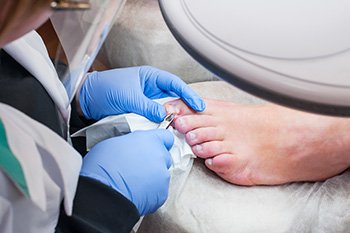
An ingrown toenail occurs when the edge of the nail grows into the surrounding skin, leading to pain, swelling, and potential infection. This common condition can arise from improper nail trimming, wearing tight shoes, trauma, or naturally curved nails. While some may attempt self-care remedies, seeking professional assistance from a podiatrist is vital for safe, effective relief and treatment. Podiatrists possess the expertise to accurately diagnose the severity of the ingrown toenail and recommend appropriate interventions. Treatment methods may include gentle nail trimming, lifting the nail edge, or in severe cases, surgical procedures to remove the ingrown portion of the nail. Ignoring an ingrown toenail or attempting amateur treatments can make the problem worse, leading to complications such as infection or chronic pain. It is suggested that you make an appointment with a podiatrist for tailored treatment to alleviate discomfort from an ingrown toenail.
Ingrown toenails can become painful if they are not treated properly. For more information about ingrown toenails, contact one of our podiatrists of Sutera and Jones Surgical Podiatry. Our doctors can provide the care you need to keep you pain-free and on your feet.
Ingrown Toenails
Ingrown toenails occur when a toenail grows sideways into the bed of the nail, causing pain, swelling, and possibly infection.
Causes
- Bacterial infections
- Improper nail cutting such as cutting it too short or not straight across
- Trauma to the toe, such as stubbing, which causes the nail to grow back irregularly
- Ill-fitting shoes that bunch the toes too close together
- Genetic predisposition
Prevention
Because ingrown toenails are not something found outside of shoe-wearing cultures, going barefoot as often as possible will decrease the likeliness of developing ingrown toenails. Wearing proper fitting shoes and using proper cutting techniques will also help decrease your risk of developing ingrown toenails.
Treatment
Ingrown toenails are a very treatable foot condition. In minor cases, soaking the affected area in salt or antibacterial soaps will not only help with the ingrown nail itself, but also help prevent any infections from occurring. In more severe cases, surgery is an option. In either case, speaking to your podiatrist about this condition will help you get a better understanding of specific treatment options that are right for you.
If you have any questions please feel free to contact one of our offices located in Media, Glen Mills, Riddle Memorial Hospital, and Concordville, PA . We offer the newest diagnostic and treatment technologies for all your foot and ankle needs.
